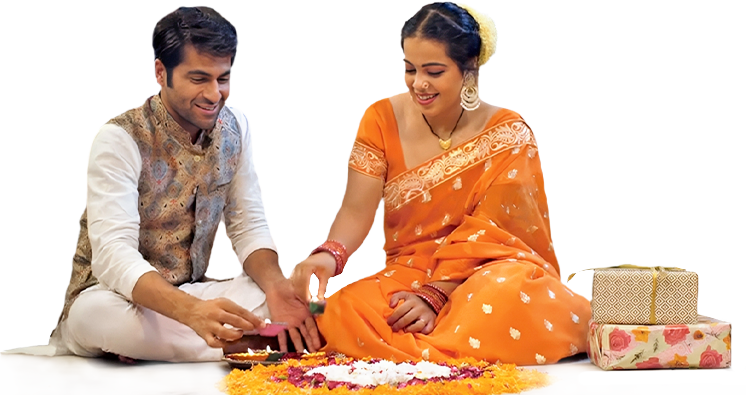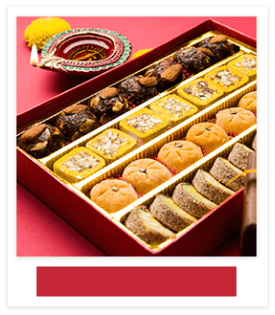

When is Diwali
This year Diwali is going to be celebrated on October 20, 2025. This beautiful festival of lights is marked with great zeal on ‘Amavasya’ or new moon, i.e. the 15th day of Kartik month, according to the Hindu calendar.
Diwali Muhurat 2025
Monday, 20 October, 2025
Lakshmi Puja Muhurat: 07:08 PM to 08:18 PM
Duration: 1 Hour 10 Mins
Meaning of Diwali
Diwali is a five-day long Festival of Lights celebrating the return of Lord Rama to Ayodha after a 14 years Exile and after defeating Demon King Ravana in a fierce battle in Lanka. The word 'Diwali' literally means ‘Row of Lights.’ The word originated from the Sanskrit words for lamp ‘dipa’ and row ‘avali’, so the festival is also called Deepavali.
Diwali is also associated with the worship of the Goddess of wealth, Lakshmi, and marks the beginning of the financial year in India. The festival is celebrated with great enthusiasm and spirit across India, Nepal, Sri Lanka, Singapore, Malaysia, Indonesia, Mauritius, Suriname, Trinidad and South Africa. The festival is observed for five consecutive days, beginning with Dhanteras and lasting till Bhaiya Dooj.
Diwali is the festival of victory of light over darkness, and spreads the message of gaiety, brotherhood and love in the society. This festival is a special occasion celebrated both collectively and individually, which has religious, cultural and social specialties. The reasons and methods of celebrating Diwali are different in every province or region, but this festival is going on for many generations everywhere.
Why is Diwali Celebrated?
Goddess Lakshmi Birthday
It is believed that the Goddess of wealth and prosperity, Lakshmi incarnated on the new moon day (Amavasya) of the Kartik month during the churning of the ocean (Samudra-Manthan); therefore the day is associated with Goddess Lakshmi.
Vishnu Ji Saved Lakshmi from King Bali
On this very day, Lord Vishnu, in his fifth incarnation of Vaman-avatar, rescued Lakshmi Ji from the prison of King Bali, and this is another reason for worshipping Devi Lakshmi on Diwali.
Lord Krishna Destroyed Narakasura
Lord Krishna killed and overcame evil king Narakasura on the day preceding Diwali to rescue about 16,000 women from his captivity. The celebration of this moment lasted for two days, including the Diwali day as a victory festival.
The Victory of Rama over Ravana
According to the epic ‘Ramayana,’ it was the new moon day of Kartik when Lord Ram, Mata Sita and Brother Lakshman returned to Ayodhya after killing Ravana and overpowering Lanka. The people of Ayodhya decorated the entire city with the earthen lamps and illuminated it like a bride.
From Mahabharata
As per the great epic ‘Mahabharata’, it was on Kartik Amavasya when the Pandavas returned from their 12 years of banishment (vanvas) as a result of their defeat from the Kauravas in the game of dice. The followers of the Pandavas celebrated the day by lighting earthen lamps on their way.
Coronation of King Vikramaditya
Vikramaditya, the greatest of Hindu Kings, was crowned on the very day of Diwali; therefore, Diwali became a historical event as well.
Diwali as a Harvest Festival
Diwali initially began to be celebrated as the festival of harvest. It is the season when farmers in India reap their harvest and worship the Goddess Lakshmi -the Goddess of wealth and prosperity, by offering her portions from fresh harvest.
A Special Day for the Sikhs
The third Sikh Guru Amar Das Ji regularized Diwali as a Red-Letter Day when all Sikhs should gather to seek the Guru's blessings. Also, in the year 1577, the foundation stone of the Golden Temple at Amritsar was laid on Diwali Day. Additionally, in the year 1619, the sixth Sikh Guru Hargobind was released from the Gwalior fort along with 52 kings after he was held by the Mughal Emperor Jahangir.
Important Day for the Jains
Mahavir Tirthankar, the founder of modern Jainism, also attained his nirvana on Diwali day.
Maharshi Dayananda Attained Nirvana
The day holds a special significance for the Arya Samaj community as well. It was the new Moon day of Kartik (Diwali day) when Maharshi Dayananda, one of the greatest reformers of Hinduism and the founder of Arya Samaj, gained his nirvana.
Importance of Diwali in Buddhism
Buddhists observe Diwali to celebrate the conversion of Emperor Ashoka to Buddhism on this day. The festival is popularly known as Ashoka Vijayadashami among the Buddhists and they celebrate it by chanting prayers and decorating the monasteries.
How is Diwali Celebrated?
The festival of Deepavali is observed with equal warmth by Hindus, Sikhs, and Jains for different reasons, although the main theme which remains throughout is the triumph of light over darkness and good over evil. The festival lasts for five bright days. Diwali is celebrated by lighting earthen lamps and illuminating artificial lights in and around houses, offices and all places wherever possible. According to the holy Skanda Purana, the Diyas symbolize the Sun, representing it as the cosmic supplier of light and energy. Diwali 2025, a festival of lights, stretches back more than 2,500 years. Like many Hindu festivals, this classic celebration is connected to multiple stories in religious writings, and it is difficult to say which came first, or how long ago Diwali started.
Dhanteras
Dhanteras marks the first day of this festival. The day falls on the thirteenth lunar day of Kartik month’s Krishna Paksha. People worship Goddess Laxmi and Lord Dhanvantari for prosperity and health. There is a fable in the Puranas that during the churning of the sea, Lord Dhanvantari had descended with the white nectar pot. We should donate a lamp for Yamraj in the evening.
Choti Diwali
After Dhanteras, the festival of Narak Chaturdashi or ‘Roop Chaudas’ is celebrated, which is also called Chhoti Diwali. On this day, people wake up before sunrise and apply oil on their body and then take a bath. This time Chhoti Diwali will be celebrated on 19th October.
Diwali - Maha Laxmi Poojan
It occurs on the Kartik Amavasya. On this auspicious day, Goddess Mahalakshmi, Ganesh, the God of wisdom and Lord Kuber are worshiped. Diyas, candles, artificial lights are illuminated in the evening and crackers are fired. People wear fresh, new clothes and distribute sweets and diwali gifts among friends, relatives, and colleagues.
Govardhan Pooja
Celebrated after Diwali, Goverdhan Pooja honours Lord Krishna's act of lifting Mount Goverdhan - One of the many miracles also called Leelas shown by The Vishnu Avtara to the World. Based on scriptures, Lord Krishna lifted mount Goverdhan to protect the villagers of Vrindavan from Lord Indra's rainstorms when the villagers refused to pray to Lord Indra, teaching Indra a powerful lesson about humility and devotion. Today, devotees create small mounds of cow dung and soil, decorate them with flowers and lamps, to symbolize Mount Goverdhan. These miniature mountains become the centerpiece of worship as people offer prayers and cook and offer traditional foods, expressing their gratitude for nature's blessings and hailing Shri Krishna as the saviour. This festival beautifully captures the harmony between humans and nature, reminding us of Lord Krishna's divine protection and the importance of environmental respect.
Bhai Dooj
Also called Yama Dwitiya. On this day, people wake up in the morning and view the moon. People living on the banks of Yamuna bathe in the river Yamuna. On this special day, Goddess Yamuna invited Yama to her home to eat; hence, it is called Yama Dwitiya. Brothers visit their sister's home, where they are welcomed with a tilak ceremony and offered food and gifts. In return, sisters are also showered with cash, clothes, gifts, etc. There is also a trend in the Puranas to donate lamps in the evening.
Which Hindu Month Does Diwali Fall?
Diwali is one of the most important festivals celebrated by Hindus all around the globe. The festival falls in the month of Kartik, according to the Hindu calendar. And as per the Gregorian calendar, the festival falls during the months of either October or November. The Hindu calendar consists of 12 months and the month of Kartik is the month of Lord Vishnu. This month is loaded with festivities comprising Karvachauth, Ahoi Ashtami, Dhanteras, Narak Chaturdashi, Diwali, Govardhan Puja, Bhaiya Duj, Kartik Purnima. coming one after the other. It is considered the most auspicious month of the Hindu Calendar. This month, charity, bathing and Tulsi Puja have special significance. It is said that in the month of Kartik, one should worship Lord Vishnu and Tulsi after having a bath in the Brahma Muhurta.
Diwali 2025 Dates in Indian Calendar & Timings in India
| Dhanteras 2025 | Sat, 18 Oct, 2025 |
| Choti Diwali/Narak Chaturdashi 2025 | Sun, 19 Oct, 2025 |
| Deepavali 2025 / Maha Lakshmi Pujan 2025 | Mon, 20 Oct, 2025 |
| Govardhan Pooja 2025 | Wed, 22 Oct, 2025 |
| Bhai Dooj/Bhaiya Duj 2025 | Thu, 23 Oct, 2025 |
Diwali Pooja Vidhi
On the day of Diwali, Lakshmi puja is performed in the evening to invite Goddess Lakshmi at home. Worshiping Lord Ganesha, Goddess Saraswati and Kubera along with Lakshmi Ji on the occasion of Deepawali is considered to be auspicious. Place a photo or idol of all the deities in your pooja place and light it with diyas, dhoop, flowers, rangoli and camphor along with the below mentioned ingredients.
Ingredients of Deepawali Puja/ Diwali Pooja Samagri
Lakshmi, Saraswati and Ganesha Ji's picture or idol, roli, kumkum, rice, betel leaves, five betel nuts, cloves, cardamom, incense sticks, clay and copper lamps, kalava, cotton, coconut, panchamrit, curd, honey, holy Ganga Jal, jaggery, turmeric, coriander, fruit, flowers, wheat, barley, durva, chandan, ghee, milk, nuts, kheel, batashe, janeu, white cloth, perfume, chowki, kalash, lotus gatta mala, asan, thali, silver coin.
Diwali Puja process / vidhi at Home
Sprinkle Gangajal (holy water from river Ganga) on your asan to purify the surrounding chanting the following mantra:
“ऊं अपवित्र : पवित्रोवा सर्वावस्थां गतोऽपिवा। य: स्मरेत् पुण्डरीकाक्षं स बाह्याभ्यन्तर: शुचि : !!"
Spread a white cotton cloth and keep a handful of grains in the center. Now place the Kalash in the middle of the grains. Fill the Kalash with water and put one betel nut (supari), one marigold flower, a coin and some rice grains. Place 5 mango leaves on the Kalash in a circular design. Now Place the idol of Goddess Lakshmi in the center and the idol of Lord Ganesha on the right side (South-West direction) of the Kalash. Take a thali and make a small flat heap of rice grains, draw a lotus flower with haldi, put some coins and place it in front of the idol. After that place your wealth and business-related items in front of the idol. Apply tilak to all the deities - Goddess Lakshmi, Saraswati, Lord Ganesh and Kuber and light diyas. Apply tilak to Kalash also. Now offer flowers to the Goddesses and Gods. Keep some flowers in your palm for prayer. Then, recite the Diwali puja mantra. After prayer, offer the flowers kept in your palm to Ganesha and Lakshmi.
Take the Lakshmi Ji's idol and rinse it with clean water followed by panchamrita. Rinse again with water, wipe with a clean cloth and place it back on the Kalash. Now offer haldi, kumkum and rice to the idol. Place a flower garland around the neck of the Goddess. Light an agarbatti in front of the idol. Take coconut, supari, paan leaf and offer it to the Goddess. Offer fruit and sweets. Put some flowers and coins in front of the idol. Read the Srisukta, Lakshmisukta and Kanakdhara to woo Goddess Lakshmi. In this way, worship is completed. After the worship is complete, pray for forgiveness for all the mistakes while performing the Pooja. Now take a diya in a thali, puja bell and perform the Lakshmi aarti.









